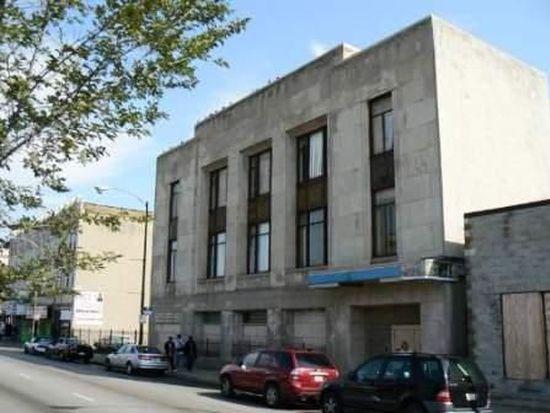
Old Standard Bank
Spike O'Donnell - king of 79th Street
From the end of World War One until the 1980's the Art Deco building at 7919 S. Ashland Avenue in the Highlands of Gresham - 60620 -was the safest bank in the Midwest. Standard State Bank was where Edward J. "Spike" O'Donnell kept his loot. Today, a young anti-police Democratic activist, who States Attorney Kim Foxx allowed Ja'Mal Green to plead down nine felony charges to a single misdemeanor charge, is also being gifted with this ediface.

Spike O'Donnell was the only racketeer from the Capone Beer Wars to die in his sick bed without handcuffs, or beefy guards doing the death watch.
Unlike too many of his brothers ( Steve, Charlie, Walter were all killed and a younger brother blinded) who were taken for the long short-ride, or gunned down in the lobbies their apartments, Spike quit the beer rackets, lived life and enjoyed decades of notoriety and 79th Street celebrity operating asphalt, heating oil and paving operations from his suit above the old Highland Theater one block north of Standard Bank.
He was not too legit to quit. Spike was too smart to become more of a bullet magnet.
Spike O'Donnell owned several large bungalows west of Ashland Avenue in the 1930's. He lived at 8145 S Honore. He and his family suffered the gangster life. In April 1932, Spike's brother Charles was gunned down in the lobby of his apartment near 91st & Ashland and later died of gangrene in Little Company of Mary Hospital.
That same month two men, one Walter Zwolinski who had been kicked out of the O'Donnell mob, for shooting Charlie O'Donnell's pet goat, broke into Spike's home at 8145 S. Honore. " in hopes of killing Spike, but find only his wife Elizabeth at home. Frustrated in their efforts, they throw her down the basement stairs, but she sustains only minor injuries. Speculation suggests that one of the men was former O'Donnell gang member Walter Zwolinski, who is now a member of the McGeoghegan-Quinlan Gang. Since his expulsion from the South Side O'Donnell Gang for killing Steve O'Donnell's pet goat in a fit of rage, increasingly unstable Zwolinski is suspected in separate attacks on Steve and Spike as well as the fatal wounding of Charles O'Donnell."
In May, Walter Zwolinski was found slumped over the wheel of his car with six bullets in his head.
Spike O'Donnell put the gains of crime into accounts at Standard Bank 7919 S. Ashland.
There is a tale on the south side that might be apocryphal - at the start of the Depression there was a run on the bank and Spike O'Donnell showed up in the lobby with several suitcases stuffed with cash and also tucked under his arm was a violin case, also loaded with the long green difference.
The 6'4" O'Donnell announced to the throng of worried depositors, " I am putting dough in Standard and also the cash from Father Steve McMahon's Little Flower Church, rectory and school. This dough is going no where."
Little Flower, St. Sabina, St. Killians, St. Etheldreda and Leo High School held accounts with Standard Bank. It was the safest bank around.
And the dough remained. Standard Bank has many branches in southwest city and suburbs.
The branch on Ashland closed in the 1980's.
The building is in the possession of young Ja'Mal Green, who has become as prominent as Chance the Rapper, thanks to Democrats like former Governor Pat Quinn, Cook County Board President Toni Preckwinkle and her creature Cook County States Attorney Kim Foxx.
Spike O'Donnell once robbed the Stockmen's Trust and Savings Bank at 5425 S Halsted and did a stretch in Joliet, until he was pardoned by Governor Len Small. Spike was never given a bank.
Green said he now hopes to focus on the youth center he's trying to establish in Auburn Gresham. Green and his supporters bought a 12,500-square-foot building at 7919 S. Ashland Ave. last week.
Green, who has protested violence and police brutality, has spent months raising money for the Majostee Allstars Youth Center. He hopes the center can become a spot where locals learn about opening businesses, drop their kids off for day care or express themselves at concerts and open mic nights.
The center will also offer mental health services and mentoring opportunities.
"That's what Majostee Allstars is all about, is telling our young people in these communities you may have ... a lack of investment in your community, but no matter where you're from you can still be something and you can still have hope," Green said.
Ja'Mal Green wants to make this gift an opportunity for more young men like himself. Donation are funneled through Pastor Pfleger Industries:
How to Help the Youth CenterThere hasn't been this much bullshit on Chicago's streets since the Stockyards closed.
• Donate on GoFundMe
• Send PayPal donation to MajosteeAllstars@gmail.com
• Mail check to St. Sabina, 1210 W. 78th place. Make it out to "Majostee Allstars."
• Buy a Majostee or Transform the 9 T-shirt online
Spike O'Donnell had friends in high places and so does Ja'Mal.
Is this a great city, or what?













